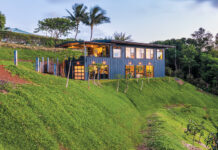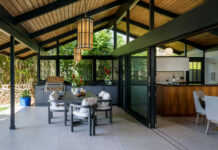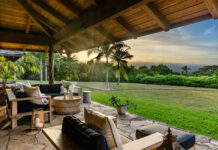Story by Rita Goldman| Photography by Tony Novak-Clifford | Photo Styling by Michele Lin
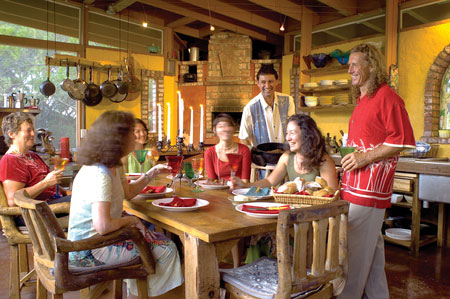 “This property,” says Chris Speere, his gesture encompassing the four acres surrounding his Huelo home, “this property is about the table, and the wonderful people we have met through food.”
“This property,” says Chris Speere, his gesture encompassing the four acres surrounding his Huelo home, “this property is about the table, and the wonderful people we have met through food.”
It’s Sunday morning, and the Speeres—Chris and Becky, and their daughters, Kali and Tori—are gathered around the big wooden table in the family’s airy kitchen. Becky retrieves a Finnish pancake from the wood-burning stone oven, slices it into wedges and serves it with pureed liliko‘i from a vine just outside. The fresh-brewed coffee is a 100 percent Maui blend produced at Maui Community College, where Chris heads the culinary department’s research and development program.
Beyond the screened wall that overlooks the kitchen garden, an unseen stream brings the murmur of moving water.
Separated from the main house by a path of stepping-stones, this kitchen is the heart of the Speeres’ home, and understandably so. Food—the joy of preparation, the sharing with family and friends—is a way of life. For more than 20 years, it’s been how Chris and Becky earned their daily bread.
Etched glass doors lead from a sunny, screened porch to the L-shaped great room of the main house.
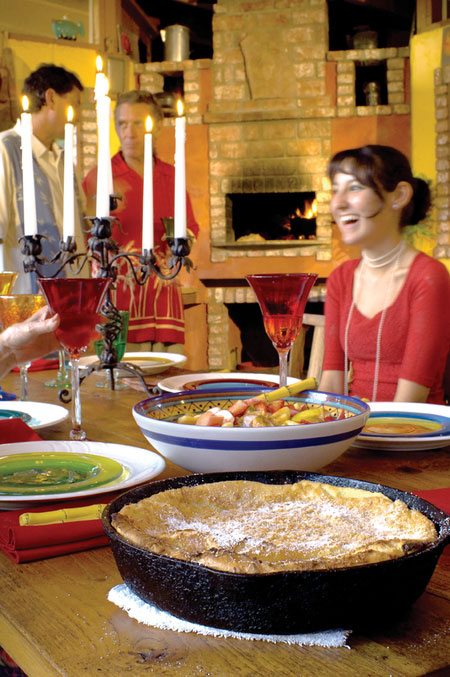 Food, in fact, is how they met in 1986, he as a sous chef, she as a pantry cook at the newly opened Maui Prince Hotel. They married in 1988.
Food, in fact, is how they met in 1986, he as a sous chef, she as a pantry cook at the newly opened Maui Prince Hotel. They married in 1988.
Soon after, Chris was offered a full-time position in MCC’s Culinary Arts Department. “That was the best decision I made,” he grins, “outside of marrying Becky.”
Chris and his students work with local farmers and ranchers to encourage diversified agriculture on Maui. “We need to find new avenues for agriculture. The more we produce ourselves, the better our chance to be successful.
“It’s what we did at the café.”
“The café,” as any self-respecting Ha‘iku resident will tell you, is Pa‘uwela Café, the popular little bakery/restaurant Becky opened in 1994 in a former pineapple cannery on West Kuiaha Road. For 10 years, Becky ran the café, managed the staff, baked the breads and pastries. Weekends, Chris was the chef, but Becky, he says, “was the soul of the café.”
It wasn’t just the great homemade food. For Upcountry residents, Pa‘uwela Café became a favorite gathering spot, where you could count on running into friends and neighbors, or impress visiting family with your insider’s epicurean knowledge.
Legions of regular customers became friends.
“The café’s bookkeeper, Kay Jackson, is a friend and helped us find this property,” Becky recalls. “John Santos, of JS Construction, was a Pa‘uwela customer. He graded the land. Travis Grant, another friend and customer, designed and built the main house. I think every piece of this property has been touched by people we knew through the café.”
Located in a region the Hawaiians named ‘Ulalena for the mist that sweeps across these windward slopes, the Speeres’ property descends from a ridge beside a narrow country road to that euphonious, tree-hidden stream.
“We thought about building a big house up on the ridge, with a porte cochere and all that view,” says Becky. “But we didn’t want to be right by the road, so we decided to build close to the stream. And then we thought, why build a big house, when our girls will be gone in a few years?”
The modest house they opted for was a design Travis Grant had created previously. Chris and Becky had him eliminate most of the interior walls, creating a large L-shaped room beneath a high ceiling that accommodates the girls’ bedroom loft. The simplicity of this open design is the perfect backdrop for beautiful wood floors, handmade and antique furnishings, and art enough to fill a second home.
“The floors are Brazilian cherrywood,” says Becky. “The dining table is huang huali, an extinct Chinese wood. I found it at the antique store Brown and Kobayashi in Wailuku.
“I found these at a yard sale in Kula,” she adds, sliding the shoji doors that close off the bathroom and master bedroom. “I stored them for 10 years before we built this house.”
The black-and-white doors are a counterpoint to the bathroom’s floor and shower walls of Chinese black slate, and to the bedroom’s red walls. A tansu (chest) of pine adds another Asian accent, but a large painting of Becky, by Nancy Hoke, is pure Maui—and another café connection. Becky used to display and sell Hoke’s prints and post cards there.
The same was true for glass artist Rick Strini and his wife, Debra, who began as customers and became friends.
“We started buying and selling their glass at the café,” says Becky. On her last birthday, the Strinis gave Becky the blown-glass chandelier that now hangs in the kitchen.
That kitchen. That stone-oven-anchored, half-open kitchen. Why a whole separate building for a kitchen?
“When we moved here, four years ago, this was just a concrete slab, no walls, no roof,” says Chris. “Giuseppe Fratus, a master mason from Milan, built our stone oven. He’s an amazing, old-world person. When it would rain here, the carpenters who were building the house would say they couldn’t work, but Giuseppe would be here with just his wheelbarrow, some string and a shovel. He used the carpenters’ scrap wood for the oven’s forms.
“Our very first pizza party, it started pouring. Our guests were all standing around with umbrellas. Okay, so we need a roof. Then came the mosquitoes. Okay, so we need to screen.”
Eventually the Speeres added some walls, but kept much of the open-air feeling. “If you’re living so close to nature,” says Chris, “you want to be outdoors.”
You also want to plan your time. The stone oven takes about two-and-a-half hours to heat to its optimum pizza-baking temperature—around 700 degrees, or when the interior walls turn white. That’s not counting the time it takes to harvest and dry the wood. So most days, the family uses the kitchen’s conventional oven, and saves the stone oven for Sundays and entertaining.
“A wood-burning oven brings you into a different mindset,” says Chris. “You’re not just turning a switch. You have to go through the process of building a fire; for me, this is like therapy.
“When people come into the kitchen, it’s warm and inviting and comfortable. We build on that, when we entertain, by having everyone help with the meals. You make your own pizza, roll it out, put the ingredients you want on it, get your hands covered in flour. To be able to bring people into our life in this way is very special.
“Out here, we’re off the grid; it’s all solar power and water catchment, and a 450-foot well. When we bought the land, we knew it would be the most wonderful thing to do, to be pioneering. We’ve learned that we have to be aware of how we use our energy, to check our solar station and batteries; if the weather’s bad for a week, to keep an eye on the system, and maybe hook up a generator. This conversion to sustainable living has helped us to appreciate the land and its natural resources.”
“Everyone talks about sustainability,” Chris adds. “What is the sustainable life? All the people you come in contact with. People we got to know through the café, we continue to have relationships with. They came in as customers every day, and when we needed work done, we hired them. That’s the beauty of this place we call our home—it’s connected to all the people we’ve met over the years.
Becky Speere’s Huelo-Maui Pancakes:
Heat oven to 425 degrees.
Put heavy 10” cast iron pan in oven with 4 Tbsp. butter.
Heat butter in oven to a nutty brown color, then pour in batter. (Recipe follows.) Bake 20-25 minutes till puffed, golden brown and cooked through in the center.
Batter: In blender, place:
- 4 large Maui-grown eggs
- 1/4 c. Maui honey
- 2 1/2 c. Soy milk or milk
- 3/4 tsp. Kosher salt
- 1 cup Unbleached all-purpose flour
Blend until smooth and honey is mixed well with rest of ingredients.
To serve: Sprinkle generously with powdered sugar. Serve with fresh liliko‘i (passionfruit), sweetened with Maui Plantation white sugar, to taste, and a big bowl of luscious, fresh, organic tropical fruit salad (pineapples, bananas, papaya, mango, atemoya . . . whatever is in season).


